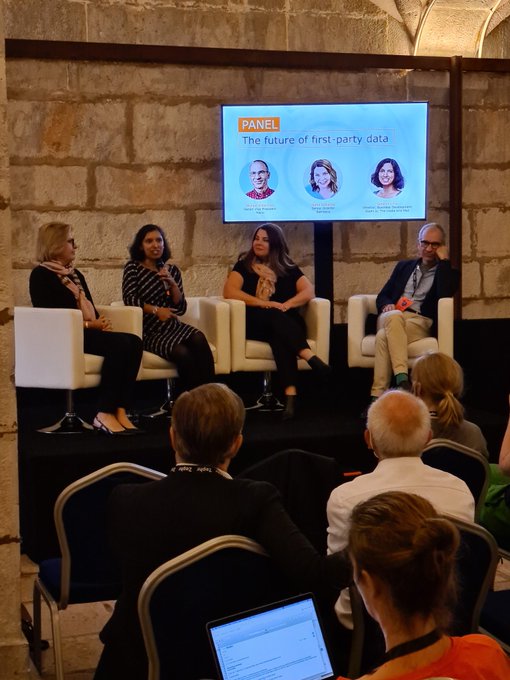|
Getting your Trinity Audio player ready...
|
Driving first-party data is a top priority for publishers, and has become particularly crucial as revenue-enabling third-party cookies disappear in 2023.
At the introductory session of Di5rupt and FIPP’s World Media Congress 2022, Martha Williams, CEO of the World Newsmedia Network, hosted a wide-ranging session covering publisher first-party data. The seminar also included the launch of FIPP‘s in-depth white paper on the topic.
Williams opened by explaining that publishing is moving from a cookie-led environment to a content-led environment, before advising publishers to make sure that a clear value exchange is made between a publisher’s audience and any request for personal data.
Value exchange is paramount – every time you get data from a customer, you need to give them something back in return. The world’s leading media companies are now putting this value exchange at the very heart of their business strategy.
Martha Williams, CEO, World Newsmedia Network

Williams then opened the floor to a number of other speakers including Simen Breem, Senior Manager, Privacy, Schisted; Danny Spears, COO, Ozone Project; Michael Silberman, SVP, Piano; Jaime Schulties, Senior Director of Media Partnerships, Bombora; Sonali Verma, Business Development Director, The Globe & Mail, Canada; and others.
Here are some of the key takeaways and quotes:
Data leakage

Danny Spears, COO, Ozone Project started off by telling attendees that whilst premium publishers are getting more traffic than ever before, and with more attention-time, advertising revenue should be growing….but it’s not. Spears argued that a key reason for this was the sheer scale of data leakage – with the average publisher getting no value exchange for the data that is scraped off every page by third-party vendors (programmatic vendors, content recommendation platforms, brand safety data vendors, etc).
Spears named the New York Times as a standout example, but by no means abnormal, of a premium publisher leaking data across a vast number of vendors, suppliers, and ad tech specialists, totaling numerous separate leakage points on a typical page.
If there is one takeaway from my presentation it’s this – stop leaking data. Data leakage is an important hygiene issue for publishers. Data shouldn’t be given away for free.
Danny Spears, COO, Ozone Project
Spears then gave an example of a leading UK news publisher addressing the issue by constricting the supply of their advertising inventory by over 70%. The impact on revenue, despite the constriction of supply, led to 40% more programmatic revenue growth (chiefly through yield increase). He added, “by squeezing Google out of auctions, publisher revenue will go up as you remove single supplier exposure”.
Publishers must take back control of audience identity in the programmatic supply chain.
Danny Spears, COO, Ozone Project
Protecting privacy
Simen Breem, Senior Manager, Privacy, Schisted then took the stage to talk about Schisted’s data-empowered culture and user privacy.
If you have a first-party data strategy, then privacy is a vital component of this.
Simen Breem, Senior Manager, Privacy, Schisted
Breem continued by telling the audience that unifying a publisher’s privacy approach is key, adding, “You need one single privacy approach across every publisher brand and domain in your portfolio. You also need decisions to come from the top, not at brand level, in order for this approach to work and to scale effectively.”
Is consent the only way forward? Can users really distinguish what’s put in front of them? Publishers need to step up and also be responsible for privacy rather than just leave it to the users.
Simen Breem, Senior Manager, Privacy, Schisted
FIPP First-Party Data Strategies
The next session saw James Hewes, CEO of FIPP, interview Martha Williams, CEO of the World Newsmedia Network, about FIPP’s newly released First-Party Data Report authored by Williams.
Interoperability of all the various technologies within a first-party data strategy is key.
James Hewes, CEO, FIPP
Williams continued on the theme of value exchange, naming Dotdash Meredith as an example of a publisher who won’t ask for any user data or information unless something is offered back in return – a piece of free content (e.g. recipe), a free newsletter, a free event, etc.
It’s a progressive strategy that becomes one of give and take, a relationship, lifetime loyalty through a shared value exchange.
Martha Williams, CEO, World Newsmedia Network

Williams then continued by saying how many media companies are using their first-party data to get to understand their customers better, and by doing so are then able to build products specifically for them using the data collected.
William’s again mentioned Dotdash Meredith as a company that has not only a wealth of customer data but has used the data to identify those segments of their market that they aren’t reaching.
Dotdash Meredith has up to 12,000 points of data on each customer, but they also know what data is missing. By asking how they could reach customers they weren’t already reaching, the publisher created some cooking shows specifically for Hispanic women – as just one example.
Martha Williams, CEO, World Newsmedia Network
The value of data
Finally, we listened to a panel including Michael Silberman, SVP of Strategy at Piano; Jaime Schulties, Senior Director of Media Partnerships, Bombora; and Sonali Verma, Business Development Director, The Globe & Mail, Canada.
Our registered users tend to convert at nine times the rate of our unregistered users, so getting users to register is important in order to develop a relationship.
Sonali Verma, Business Development Director, The Globe & Mail, Canada.

“Two years ago, first-party data used to be like a pile of bronze coins. Now it’s a pot of gold. Publishers must invest (and partner if necessary) to create a solid first-party data strategy.
Jaime Schulties, Senior Director of Media Partnerships, Bombora
60-70% of your audience just visits one page and then disappears. The other 30-40% is consuming valuable content and they understand that there needs to be a value exchange. Registered web is the future and inevitable.
Michael Silberman, SVP of Strategy at Piano
And finally, a sober point …
Most publishers only have just 1-3% of known user data.
Martha Williams, CEO, World Newsmedia Network



